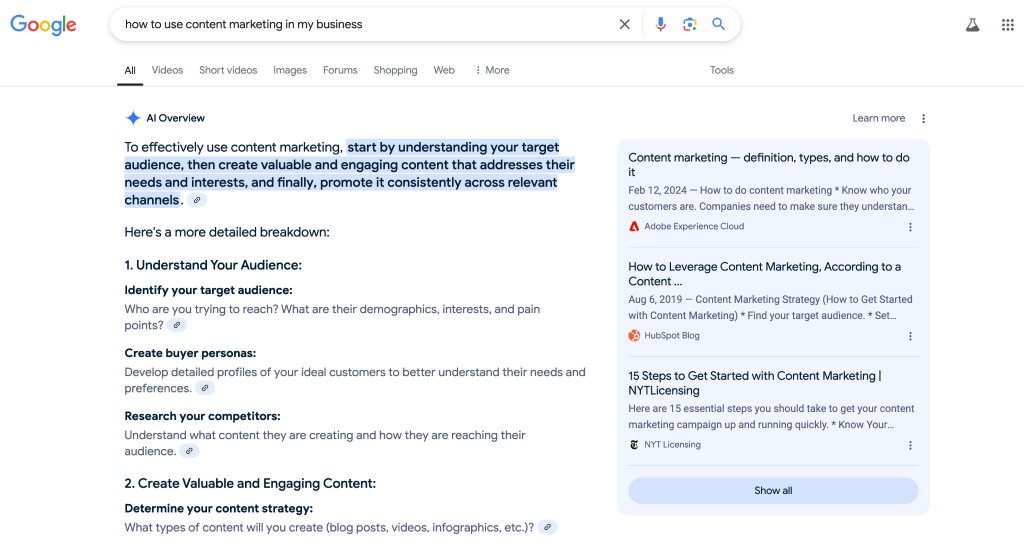Content marketing is essentially the foundation of marketing in 2025.
Everything runs on content, whether it’s SEO, social media, email, or even paid ads. It’s how brands connect, build trust, and guide customers through the buying journey.
The benefits of content marketing are clear, but not every strategy delivers the desired impact.
Many businesses struggle to see a return on their efforts due to common and often avoidable mistakes.
In this article, we’ll look at the nine most common content marketing mistakes—and how to fix them.
Schedule a Discovery Session
Learn how to attract new leads and clients.
1. Not having a clear content marketing strategy
Creating content without a content marketing strategy wastes time and resources.
You may be crafting beautiful, high-quality content, but if it does not support your business goals or speak directly to your audience, it will not succeed.
A strong content marketing strategy needs three things
- Clear goals: Define your content’s goals (for example, more website traffic or qualified leads).
- Audience research: Create content that speaks to your ideal customers’ needs, interests, and pain points.
- Editorial planning: Use a calendar, app, or other tool to keep your content organized and aligned with your broader goals.
Buyer personas help you define and segment your customers using details like age, location, goals, challenges, and preferred communication channels.
With the right foundation, each piece of content works toward a larger goal.
2. Focusing on quantity over quality
You may have heard that publishing content frequently can help improve your brand visibility and drive traffic.
However, this only applies if the content delivers real value. Low-quality content can actually harm your brand’s credibility.
To balance quality and quantity, consider the following:
- Set a realistic publishing schedule
- Repurpose your best content
- Create “content pillars” that anchor your strategy and support smaller, related pieces
- Focus on helpfulness—answering a question, solving a problem, or offering new insights
Quality content also means well-written, easy-to-read copy
Common writing mistakes like passive voice, run-on sentences, and unnecessary jargon can water down your message.
Clear, concise writing is essential for keeping readers engaged and building trust.
3. Ignoring SEO best practices
There are many questions surrounding SEO due to the rise of AI search engines like AI Overviews and ChatGPT search, but it’s still an important part of your content marketing strategy in 2025.
Core SEO elements include:
- Keyword targeting
- Meta descriptions
- Internal linking
- Content structure
Content structure is also a core element in optimizing for AI search engines.
AI search prioritizes content with clear headings (H2s and H3s), bullet points, and short sections that answer questions concisely.

The screenshot above shows how the AI Overview pulls insights from top articles.
Start tracking your brand’s visibility in AI search engines to stay ahead of your competitors as these tools evolve.
4. Not promoting your content
Publishing your content isn’t enough—you need to promote it across multiple channels to reach your audience.
A strong content promotion plan involves the following platforms and strategies:
- Email marketing
- Social media
- Collaboration with industry partners or influencers (guest posts, podcasts, etc.)
- Content repurposing
An intentional distribution strategy gets your content to the right people.
5. Overlooking the buyer’s journey
Content marketing is most effective when it meets people where they are on their buyer journey.
The stages of the buyer journey
- Awareness stage: Prospect realizes they have a problem or need
- Consideration stage: The Prospect is evaluating different solutions
- Decision stage: Prospect is ready to make a purchase
- Retention stage: Customer has purchased, so the focus shifts to loyalty and long-term value
Each stage requires specific types of content tailored to the prospect’s needs.
For example, ideal “awareness stage” content includes educational content, how-to guides, or introductory videos.
In the “decision stage,” they need proof in the form of customer testimonials, free trials, or pricing breakdowns.
6. Not tracking performance or optimizing
Without data, you’re left to guess what’s working and what’s not.
Analytics provide the insights you need to improve weak spots or double down on high-performing content.
Useful key performance indicators (KPIs) for content marketing include:
- Website traffic
- Bounce rate
- Time on page
- Conversion rate
- Backlinks and sharing
- Keyword rankings
These metrics will help you see which topics, formats, or channels resonate most with your audience and how your content supports your broader business goals.
7. Failing to update or repurpose old content
Don’t neglect your old or outdated content—it bogs down your website’s SEO performance and search engine rankings.
We practice what we preach—this article is actually a rewrite of an older piece of content on our website.
Tips to update existing content
- Check the performance metrics (if it’s still getting traffic, it deserves an update)
- Refresh outdated information like stats, links, and examples
- Improve your formatting to make it easier to read
- Optimize for new, better-performing keywords
- Add internal links to newer content
As you update, consider also how you can repurpose the content. For example, you might turn a blog post into a video, social media post, or infographic.
8. Making it all about your brand
There are many clever ways to get your services, achievements, and processes across to the reader without obviously promoting them.
Your content can’t read like a sales pitch—it has to address your audience’s specific problems and questions.
Value-driven, trust-building, customer-centric content types include:
- How-to guides
- Case studies
- Checklists, templates, or tools
- Educational videos or blog posts
- Q&A-style articles
This doesn’t mean you’re not allowed to talk about your brand; it just means you should do so in a way that prioritizes the reader’s needs.
Aim to shift the focus from “Look at us” to “Here’s how we can help you.”
9. Not having a clear call-to-action (CTA)
Every piece of content should guide the reader to the next step—even if it’s a small step.
Readers may find your content helpful, but what should they do next? This is where a clear, compelling call to action (CTA) is needed.
Strong CTAs include:
- “Download our full guide to learn more”
- “Subscribe to our newsletter for weekly insights”
- “Schedule your free consultation”
- “Start your free trial”
CTAs help you move the reader deeper into the customer journey and generate more leads. A missing CTA is a missed opportunity!
Avoid content marketing mistakes—partner with experts who get it right
From SEO and content strategy to full-service lead generation, Kaleidico helps businesses like yours create content that works.

